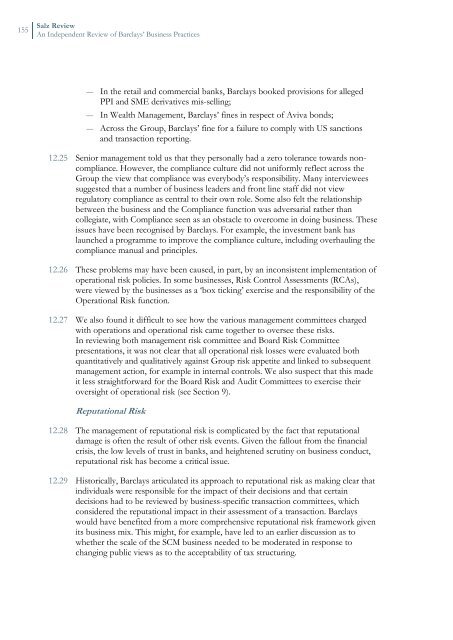Salz Review - Wall Street Journal
Salz Review - Wall Street Journal
Salz Review - Wall Street Journal
You also want an ePaper? Increase the reach of your titles
YUMPU automatically turns print PDFs into web optimized ePapers that Google loves.
155<br />
<strong>Salz</strong> <strong>Review</strong><br />
An Independent <strong>Review</strong> of Barclays’ Business Practices<br />
― In the retail and commercial banks, Barclays booked provisions for alleged<br />
PPI and SME derivatives mis-selling;<br />
― In Wealth Management, Barclays’ fines in respect of Aviva bonds;<br />
― Across the Group, Barclays’ fine for a failure to comply with US sanctions<br />
and transaction reporting.<br />
12.25 Senior management told us that they personally had a zero tolerance towards noncompliance.<br />
However, the compliance culture did not uniformly reflect across the<br />
Group the view that compliance was everybody’s responsibility. Many interviewees<br />
suggested that a number of business leaders and front line staff did not view<br />
regulatory compliance as central to their own role. Some also felt the relationship<br />
between the business and the Compliance function was adversarial rather than<br />
collegiate, with Compliance seen as an obstacle to overcome in doing business. These<br />
issues have been recognised by Barclays. For example, the investment bank has<br />
launched a programme to improve the compliance culture, including overhauling the<br />
compliance manual and principles.<br />
12.26 These problems may have been caused, in part, by an inconsistent implementation of<br />
operational risk policies. In some businesses, Risk Control Assessments (RCAs),<br />
were viewed by the businesses as a ‘box ticking’ exercise and the responsibility of the<br />
Operational Risk function.<br />
12.27 We also found it difficult to see how the various management committees charged<br />
with operations and operational risk came together to oversee these risks.<br />
In reviewing both management risk committee and Board Risk Committee<br />
presentations, it was not clear that all operational risk losses were evaluated both<br />
quantitatively and qualitatively against Group risk appetite and linked to subsequent<br />
management action, for example in internal controls. We also suspect that this made<br />
it less straightforward for the Board Risk and Audit Committees to exercise their<br />
oversight of operational risk (see Section 9).<br />
Reputational Risk<br />
12.28 The management of reputational risk is complicated by the fact that reputational<br />
damage is often the result of other risk events. Given the fallout from the financial<br />
crisis, the low levels of trust in banks, and heightened scrutiny on business conduct,<br />
reputational risk has become a critical issue.<br />
12.29 Historically, Barclays articulated its approach to reputational risk as making clear that<br />
individuals were responsible for the impact of their decisions and that certain<br />
decisions had to be reviewed by business-specific transaction committees, which<br />
considered the reputational impact in their assessment of a transaction. Barclays<br />
would have benefited from a more comprehensive reputational risk framework given<br />
its business mix. This might, for example, have led to an earlier discussion as to<br />
whether the scale of the SCM business needed to be moderated in response to<br />
changing public views as to the acceptability of tax structuring.
















